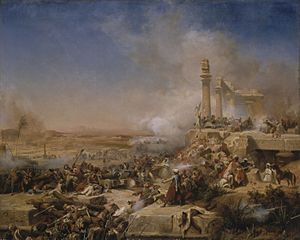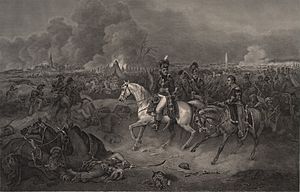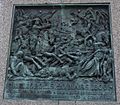Battle of Heliopolis (1800) facts for kids
Quick facts for kids Battle of Heliopolis |
|||||||
|---|---|---|---|---|---|---|---|
| Part of the French Campaign in Egypt and Syria during the War of the Second Coalition | |||||||
 Bataille d'Héliopolis, by Leon Cogniet |
|||||||
|
|||||||
| Belligerents | |||||||
| Commanders and leaders | |||||||
| Strength | |||||||
| 10,000 men | 60,000 men | ||||||
| Casualties and losses | |||||||
| 600 dead or wounded | 9,000 dead, wounded or captured | ||||||
The Battle of Heliopolis was an important fight that happened on March 20, 1800. It was part of the French Campaign in Egypt and Syria. In this battle, the French army, led by General Jean-Baptiste Kléber, fought against a large army from the Ottoman Empire. The Ottomans were supported by the British. The battle took place near Heliopolis, an ancient city in Egypt.
Contents
Why the Battle Happened
After a long time fighting in Egypt, the French army wanted to go home. Their leader, General Kléber, talked with both the British and the Ottomans. He wanted to find a way for his soldiers to leave Egypt safely.
The Agreement That Failed
They made an agreement called the Convention of El Arish on January 23, 1800. This agreement said the French could go back to France. But the British and the Ottoman Sultan couldn't agree among themselves. So, the plan didn't work out, and the fighting in Egypt started again.
A Broken Promise
The British Admiral Keith did not keep his promise from the agreement. General Kléber refused to give up his army. The British and Ottomans thought the French army was too weak to fight. So, the Ottoman leader, Yussuf Pasha, told Nassif Pasha to march towards Cairo. People in Cairo were also told to rise up against the French.
The Battle Begins
The French army moved towards a place called Mataria. They arrived there on the morning of March 20. The French soldiers formed themselves into four large squares. At the corners of these squares, they placed their cannons and special soldiers called grenadiers.
French Battle Lines
General Jean Reynier led the left side of the French army. His group included soldiers from the Joseph Lagrange and Antoine Joseph Robin brigades. General Louis Friant led the right side. His group had soldiers from the Augustin Daniel Belliard and François-Xavier Donzelot brigades.
Unexpected Changes
General Kléber also asked Murad Bey to help with his Mamluk cavalry on the right side. But Murad Bey gathered his Mamluks and then left before the battle started. He did not join the fight. Kléber himself commanded the center of the French forces. Pierre Leclerc d'Ostein led the French light cavalry in the middle.
The Fight Unfolds
Reynier's group attacked the Ottoman soldiers, called Janissaries, directly at Mataria. At the same time, Friant's group moved to block their escape route. The French cavalry then fought against the Ottoman cavalry. The Ottoman side had both Turkish and Mamluk horsemen.
The Janissaries were defeated quickly. The French then started moving towards the main Ottoman army near Heliopolis. Nassif Pasha led the Ottomans there. The Ottomans tried to attack the French, but their attack was messy. French cannon fire hit them hard, and their attack turned into a wild retreat. Finally, the French reached the Ottoman camp. The Ottoman army then ran away towards Syria.
What Happened Next
The French army had very few losses in the Battle of Heliopolis. Only about 600 French soldiers were killed or hurt. On the Ottoman side, about 9,000 soldiers were killed, wounded, or captured.
Saving the Situation
General Kléber had managed to turn a very difficult situation around. He also put down the uprising that had started in Cairo. The French position in Egypt became even stronger. Kléber even got local helpers and made friends with his old enemy, Murad Bey.
A Change in Leadership
However, General Kléber was killed later that year. His replacement, Jacques-François Menou, was not seen as a strong leader. This would affect the French army in Egypt later on.
Images for kids
-
Le général Kléber victorieux à Héliopolis, 20 mars 1800, by Philippe Grass. This is a public sculpture in Place Kléber, Strasbourg.
 | Leon Lynch |
 | Milton P. Webster |
 | Ferdinand Smith |



